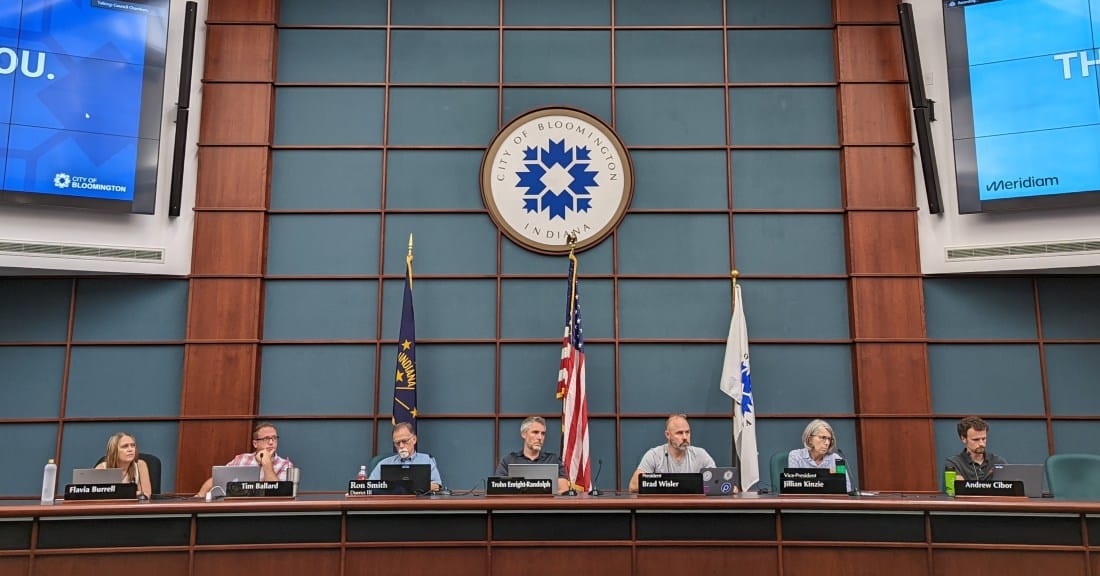One down, two to go: Fiber-to-home deal passes muster with Bloomington plan commission


A deal between a Paris-based infrastructure company and the city of Bloomington, to construct a fiber-to-the-home open-access network offering symmetric 1-Gigabit service, took a step forward Monday evening.
On a unanimous vote, the city’s plan commission found that an already-approved redevelopment commission (RDC) resolution and its associated economic development plan—on which the Bloomington-Meridiam fiber deal depends—is consistent with the city’s comprehensive plan.
That’s the first of three approvals the city’s administration is hoping to get this week for a tax increment finance (TIF) arrangement, that would see about $10.9 million in personal property taxes reimbursed to Meridiam over a 20-year period. That’s down from the estimated $14.4 million that had been previously negotiated for a 25-year period.
Next up will be an approval from the (economic development commission (EDC)), which the city administration is hoping to get at the EDC’s 4 p.m. Tuesday meeting.
That could be followed by an approval at this Wednesday’s city council meeting.
Last week, the city’s RDC took the first step towards all the approvals necessary when it passed the required declaratory resolution.
On Monday, the administration’s case for conformity with the city’s comprehensive plan was presented to the plan commission by development services manager Jackie Scanlan.
Scanlan ticked through the plan’s vision statement that talks about access to amenities for all. One of the biggest talking points in favor of the proposal is the digital equity component, which involves a $30 price-point for symmetric 250 Megabit service for lower-income residents. That works out to no cost, under the FCC’s Affordable Connectivity Program.
Scanlan also pointed to objectives in the category of community services and economics that involve increased availability of critical infrastructure or services as Bloomington grows and changes.
Included in Scanlan’s slide deck was a policy from the comprehensive plan that looks like it’s on point for the proposed arrangement with Paris-based Meridiam.
Policy 1.5.2: Partner locally to make available quality wired and wireless connectivity throughout the City of Bloomington
About that policy point, Scanlan said, “This is something that, obviously, the administration has been working on for a number of years, and we are getting close to fruition, seeing that happen.”
The word “locally” in the policy point did not draw comment or question from plan commissioners.
Plan commissioner Jillian Kinzie focused on the outcomes in the comprehensive plan—the metrics the community uses to judge the success of the policies in the plan. She was keen to see an outcome added that would include the number of actual connections to high-speed internet for low-income residents.
Much of what Meridiam has promised for its low-income program involves not just extending the fiber network to low-income areas of the city, but also providing support to low-income households to help them take advantage of the available connection.
Ron Smith, who serves as the city council’s representative on the plan commission, pointed to a goal in the plan that talks about public engagement. “I’m worried that we haven’t had much public engagement before we’re being asked to make a vote,” Smith said. Here’s what the comprehensive plan goal says:
Goal 1.6 Public Engagement: Commit to, and plan for, transparency, open government, and effective, accessible and inclusive public engagement so that exemplary services are provided to our residents, businesses, non-profit organizations, and visitors, while also promoting more participatory citizenship.
Responding to Smith, Bloomington IT director Rick Dietz said the effort to partner with a private firm to build an open-source fiber network has been going on since 2016. “We’ve had a number of public announcements about it,” Dietz said. Dietz said the current process of establishing the TIF mechanism is very public.
Dietz also pointed to the fact that Meridiam is a private company that wants to locate in Bloomington, which means that an element of the negotiations are going to be private.
Dietz indicated that if the reimbursement were not a component of the city’s support for Meridiam’s proposal, the current public process would not have been necessary. “If we weren’t going for the TIF, then this could just be a contract negotiated by the administration,” Dietz said. He added, “But we felt that not only did we want to provide the support, but we wanted the public process that goes along with it.”
Plan commission president Brad Wisler expressed some doubts about the substance of the proposal, independent of its conformance with the comprehensive plan. “I’ve never been quite comfortable with the idea of government being in the business of picking the winners in the marketplace. And that’s still difficult for me to get on board with,” Wisler said.
Wisler appreciated the fact that the initial advantage given to the internet service provider (ISP) selected by Meridiam would be only a temporary one. Under the deal, a not-yet-named ISP would have exclusive access to the network, which is supposed to become an open-access wholesale network after five to seven years.
Wisler said the purview of the plan commission was just to evaluate whether the proposal complies with the goals of the comprehensive plan. “I think clearly it does,” Wisler concluded.




Comments ()